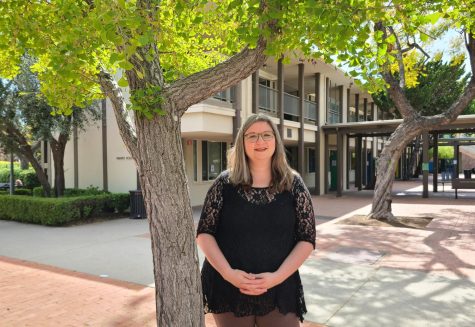How Does Westridge’s Culture of Competition and Achievement Impact Eating Disorders?
(Graphic Credit: Addie K.) Students with eating disorders at Westridge come forward about their experiences on campus.
“I think I had always had a negative focus on my body.”
Genevieve U. ’23 sat cross-legged in front of me, wearing a gray-knit sweater. Like many young girls entering adolescence, Genevieve’s struggle with food began at the age of 12. During a time in her life when she felt very out of control, Genevieve turned to controlling food and her body.
She described her eating disorder as very “black and white,” such as certain foods being only “good” or “bad.” Occasionally glancing down as she spoke, she said, “It was just an all or nothing mindset.”

Genevieve noticed that some of her Westridge classmates also engaged in disordered eating in Middle School and would often compare how much they ate to one another. Symptoms of disordered eating are often less severe or frequent than that of an eating disorder, but disordered eating behaviors can develop into an eating disorder. She attributed the prevalence of disordered eating—which includes frequent dieting, preoccupation with food, and compulsive eating habits—partially to Westridge being an all-girls school. “I think because we’re all girls going through this, we’re all comparing ourselves in such a heightened state.”
By nature of being an all-girls school, Westridge may have more students struggling with eating disorders and disordered eating behaviors than their co-ed counterparts, as adolescent girls are more than twice as likely to struggle with an eating disorder than adolescent boys. “I get a more general sense of how often [eating disorders] come up as something that students are struggling with. And I would say it feels relatively prevalent [at Westridge], just through my general understanding,” Human Development Coordinator Emily Mukai said.
Beyond the school’s identity as a girls’ school, could aspects of Westridge’s competitive culture, which specifically prioritizes academic achievement, play a role in straining some students’ relationships to food?
For students like Genevieve, grades and achievement can feel beyond their control—even when working hard and finishing all their assignments. At that point, some students turn to other aspects of their life in an effort to regain control. “You still might not get that A, but, like, at the end of the day, your body and your weight is something that you can control. What you put into your body is something that you can control,” said Genevieve.
Other students attribute part of their taut relationships with food to the environment at Westridge. Although eating disorders are caused by a variety of factors, including genetics, biological factors, and media influences, aspects of Westridge’s competitive culture can exacerbate students’ struggles.
Competition and Achievement
“I think in a school like Westridge, where people are hopeful and reaching for certain outcomes in college, there can be a competitiveness. And I think, unfortunately, sometimes for girls, that can be around bodies,” said Director of Counseling and Student Support Lisa LaFave.

Competition often plays a significant role in eating disorders, and that competition can be mirrored in characteristics of Westridge’s culture. As a college-prep, academic-focused school, students can feel that sense of competition when comparing how well they do on a test or what grade they receive in a certain class. “I feel like I tend to compare myself with others, just like achievements or their talent and ability. And I feel like that messes with my self worth, and that contributes to disordered eating. It all connects,” said Verena W. ’24, who has struggled with disordered eating.
“The culture here is very competitive. Disordered eating is also very competitive,” said Chloe Q. ’24, another student who has experienced difficulties with disordered eating.
Westridge itself may have a competitive atmosphere, but it’s sometimes due to the competitive natures of students who choose to attend Westridge. “I think that Westridge breeds eating disorders a bit just in the competitiveness of the school. They curate girls and cull them in a way where it’s all like the girls who are the most high-performing, high-pressured,” said Genevieve.
There can also be a relationship between eating disorders and a fixation on achievement and perfection. Students who are high-achieving in school may be at a higher risk for an eating disorder. Further, a school that heavily values achievement may unintentionally be contributing to that risk. Researchers in a Swedish study of high school girls found that “An aspirational school culture may inadvertently lead to increased rates of ED [eating disorders].”
“The perception of self here on campus is just really toxic. There’s an essence of, like, you are only valued by what you achieve… As like anyone with an eating disorder would feel, you want to make yourself feel invisible because you already are invisible. You want to make yourself feel smaller and smaller, because sometimes the school makes you feel that way already,” Ariana A. ’23 said.
The prevalence of eating disorders on campus has been noticeable for many students, so much so that some feel that its presence has become normalized. One student, Mia*, shared that when she began her struggle with an eating disorder, she noticed more and more students around her in a similar situation. “I wasn’t sure what was normalized versus abnormal,” she said.
Mia added that the issue with eating disorders on campus may not be specific to Westridge. “I feel like it’s more of a societal issue and not so much a Westridge issue.”
Supporting Students
Though Westridge’s climate of competition may unwittingly increase the likelihood of a student engaging in disordered eating, the school has also taken steps to support students. Westridge’s peer support program Peer-to-Peer organizes an annual “Everybody for Every Body” Week (formerly “Love Your Body” Week). Throughout this week, Peer-to-Peer encourages supportive conversations around body image and body acceptance.
The week’s main event is an Upper School-wide Town Meeting where students can share their struggles with and/or thoughts on body image and disordered eating. Sometimes, these spaces can be very activating and triggering for those who have a history of disordered eating or are currently struggling with it.
“I think that, you know, giving details about people’s struggles, can exacerbate other struggles, because there is the natural comparison of eating disorders in that community,” said Genevieve.
Dr. LaFave explained how it can be difficult to program a week that is supportive for every student. “It’s really tricky to support a whole community when we have varied and deeply personal feelings about our bodies.”
Westridge’s Human Development Program also aims to support students around topics of body image and eating. In HD class, students learn about the concept of harm reduction, which revolves around the idea that destructive behaviors may not be helpful, but they have a purpose. “Big picture goal is to resolve the feelings around the need to partake in the behavior,” Mukai said. Further, in HD, students are reminded to seek support if struggling with addiction or disordered eating.
Moving Forward
To improve student support around body image, some students suggested making changes to “Everybody for Every Body” Week. Mia discussed the importance of “body neutrality,” which describes the ability to appreciate one’s body for what it does. “I feel like maybe bringing more awareness to [body neutrality] or the function and the purpose of like our body and not so much we have to love our appearance, but we have to love what our body does for us.”

Ariana added, “Spaces like ‘Love Your Body’ Week sometimes can be very performative when there’s not that education to back it up.”
Mukai explained that a change in Westridge’s culture may also need to take place. “It would be cool to see that cultural shift happen to where maybe we’re letting go a little bit of that competitiveness as a culture, and we’re able to be more vulnerable and talk about our struggles.”
Heather Unterseher, Genevieve’s mom, explained that the “Everybody for Every Body” week is “not something that really has an impact in terms of having a culture that’s embedded with talking about eating disorders and stress… it would be amazing if Westridge spent the time and the brainpower to think about how supporting girls and steering them away from eating disorders could be infused in the culture.”
Eating disorders are not specific to Westridge and have long been a societal issue that continues to be on the rise. Beyond the Westridge campus, Dr. LaFave summed up what support and recovery for eating disorders looks like: “It’s about reclaiming who we are.”
Genevieve, who has now recovered from her eating disorder, said, “It’s really hard to stay strong and stay true to [recovery] when at the end of the day, all anyone wants is just to fit in.”
Call the National Eating Disorders Association Helpline at 1-800-931-2237 for support and assistance with an eating disorder.
*This name has been changed to protect the anonymity of the source, in accordance with Spyglass’s Anonymous Source editorial policy.

Katie is a senior, and this is her fifth year on Spyglass and third year as an Editor. In her free time, she loves playing guitar, writing, and doing calligraphy.




























![Dr. Zanita Kelly, Director of Lower and Middle School, pictured above, and the rest of Westridge Administration were instrumental to providing Westridge faculty and staff the support they needed after the Eaton fire. "[Teachers] are part of the community," said Dr. Kelly. "Just like our families and students."](https://westridgespyglass.org/wp-content/uploads/2025/03/dr.-kellyyy-1-e1748143600809.png)




























Amy • Apr 24, 2023 at 9:15 pm
You analyzed the issue in such detail, good job, Katie!